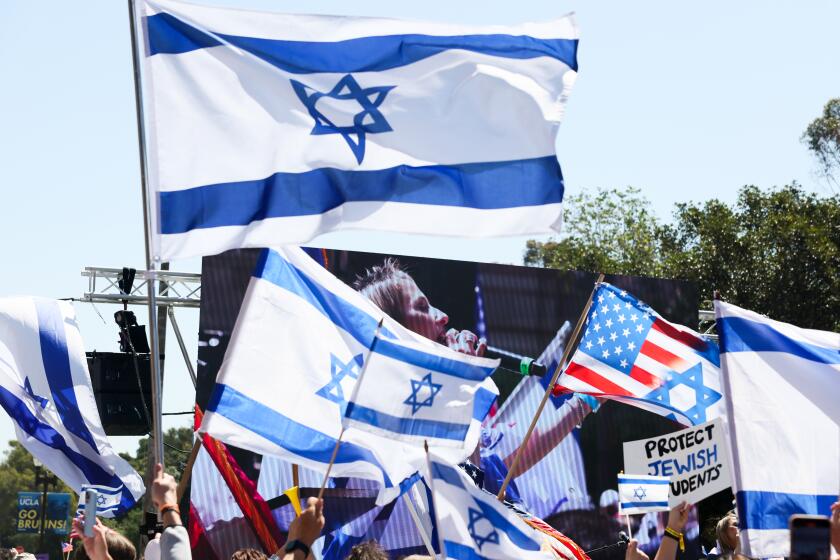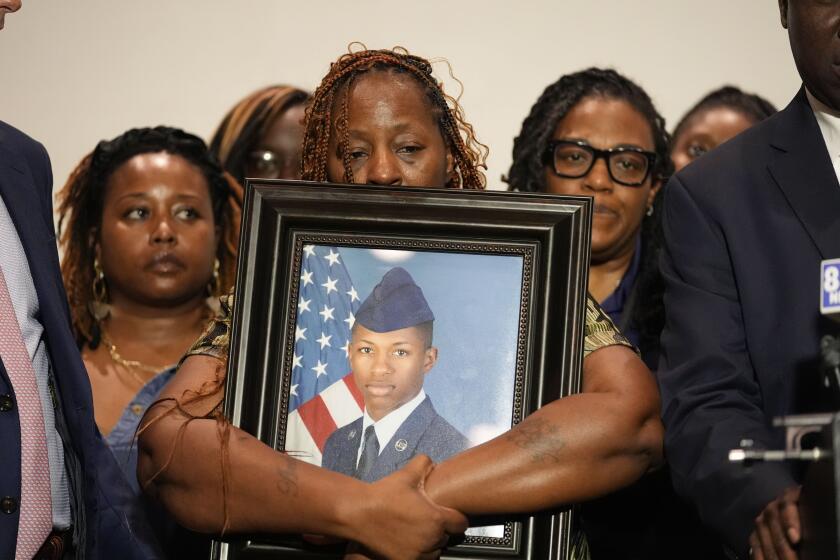Hopes for Peace Embodied in Freed Leader
When a biographer of Nelson R. Mandela offered the African National Congress a look at her new book a few months ago, rebel leader Oliver R. Tambo asked her to take out the tender love letters that Mandela had written from prison to his wife, Winnie.
“He thought it wasn’t dignified for a man of Mandela’s stature,” recalled author Fatima Meer. But Mandela overruled his former law partner, telling Meer: “You leave it all in. It’s true. There’s no reason for us to hide these things.”
The ANC has attempted for 27 years to polish the image of its jailed and unseen leader, but that exercise ended for good Sunday when the legend, gray-haired and full of vigor, walked out of prison and became a human being again.
As he waded into the tens of thousands who turned out for a glimpse of him, the ANC pondered what role to assign one of the world’s best-known political leaders in an organization that favors collective decision-making.
Mandela says that he’s a “rank-and-file” member of the ANC. But the world and most black South Africans know better. Not only do they consider the freed Mandela the primary leader in the battle against apartheid, but they have high expectations that the 71-year-old man can bring South Africa peace once and for all.
“He has no magical powers,” said Patrick Lekota, publicity secretary for the United Democratic Front, a 2-million-member anti-apartheid coalition with strong links to the ANC. “But he’s a great team worker and a very tenacious man. And he occupies a special place in the eyes of all South Africans, black and white.”
Trevor Oliver, a 19-year-old black student from Paarl, put it another way.
“He’s the leader, a natural leader,” Oliver said. “He’s well-educated. He’s got doctorates and all that. And he’s got the diplomatic ways about him.”
Mandela’s release has unleashed great hopes among the 27 million blacks in South Africa as well as among some of the 5 million whites. Even the government of President Frederik W. de Klerk, which sought to demythologize Mandela by making its own respectful statements about the man, considers Mandela’s freedom an important first step toward peace in the country.
But, as was evident Sunday in Mandela’s first speech, Mandela remains, in his own words, a member of the ANC leadership, subject to its decisions on how to approach government initiatives aimed at bringing the ANC and other black leaders to the negotiating table. And ANC officials say he will probably become part of the ANC’s leadership again, but will by no means take over completely.
“I am a loyal and disciplined member of the African National Congress,” Mandela said Sunday. “I am therefore in full agreement with all of its objectives, strategies and tactics.”
Or, as a close friend of Mandela’s recently put it more bluntly, Mandela “is trading one set of jailers for another.”
The ANC leader faces difficult challenges on several fronts.
His organization, at its headquarters in Lusaka, Zambia, is torn over how best to respond to the government’s reform measures. The old guard, feeling pressure from the Soviet Union and other world powers, is more inclined to meet De Klerk halfway.
But a younger group of military-oriented ANC leaders and soldiers, including thousands of youths in South Africa’s black townships, think the ANC should step up its military and economic pressure on Pretoria until it wins even more concessions, including the dismantling of some of the vast remaining apartheid legislation and the election of a constituent assembly based on one-man, one-vote majority rule.
“My guess is they’ll take the bait for negotiations,” says Mark Phillips, senior researcher at the Center for Policy Studies in Johannesburg. “They’ll get involved in ‘talks about talks’ and, at the same time, will try extremely quickly to educate the so-called ‘young lions.’ ”
Inside the country, Mandela faces a crisis in black education, which has been devastated by years of politically inspired school boycotts and thuggery committed in the name of the ANC.
But Mandela’s most difficult task will be finding a solution to the violence in Natal province, where ANC-supporting blacks have been battling for three years with blacks loyal to the moderate, and, critics allege, government-supported Inkatha movement of Mangosuthu Gatsha Buthelezi. That war already has claimed more than 1,500 blacks in the lush, humid valleys around Pietermaritzburg and Durban.
“If the government really means business, then we (the ANC) will have to go to the negotiation table in a very, very strong position,” said Meer, the Mandela biographer and a professor of sociology at the University of Natal in Durban. “To do that, we’ve got to close our ranks. I think Mandela is going to try to do that and he might just succeed. But it will be a difficult task.”
Ismail Ayob, a Johannesburg lawyer who has met regularly with Mandela since the 1970s, says Mandela will need to deal quickly with the expectations that have been raised by the nationalist leader’s growing stature during his years in prison.
“He’s a person who believes in what is possible, and one of his first tasks will be to bring an air of realism to the timetable” for resolving South Africa’s conflict, Ayob said in an interview. “Freedom is certainly not available just because he has come out.”
Mandela’s leadership qualities, and his ability to bridge the gap between different races and differing ideologies, were evident throughout the quarter-century he spent in Robben Island, the penal colony off Cape Town, and Pollsmoor Prison, in the city’s suburbs.
Robben Island was known as “Mandela University” during his years there, and Mandela gave political training to prisoners, settled day-to-day disputes in prison life, and even raised money for prisoners’ education.
“Mandela and (Walter) Sisulu came to see me in prison one day,” recalled Sipho Ngcobo, a young activist with the ANC’s rival guerrilla group, the Pan-Africanist Congress. “When Mandela sat down, it was as if a king sat down.”
Mandela’s most important role for the ANC may be the task of bridging the gap between blacks and whites, who have been conditioned by decades of government propaganda to fear the “revolutionary onslaught” from the ANC and its ally, the South African Communist Party.
The ANC leader is able to speak Afrikaans, the language of the Dutch-, French- and German-descended South African settlers who have controlled the National Party government since its election in 1948. And he assured whites Sunday that “the freedom movement has a political home for you, too.”
“He speaks to all the people of South Africa, both black and white,” said George Bizos, a white lawyer who helped defend Mandela in his 1964 trial. “He has always reveled in his blackness, but without any chips on his shoulder.”
More to Read
Start your day right
Sign up for Essential California for news, features and recommendations from the L.A. Times and beyond in your inbox six days a week.
You may occasionally receive promotional content from the Los Angeles Times.







